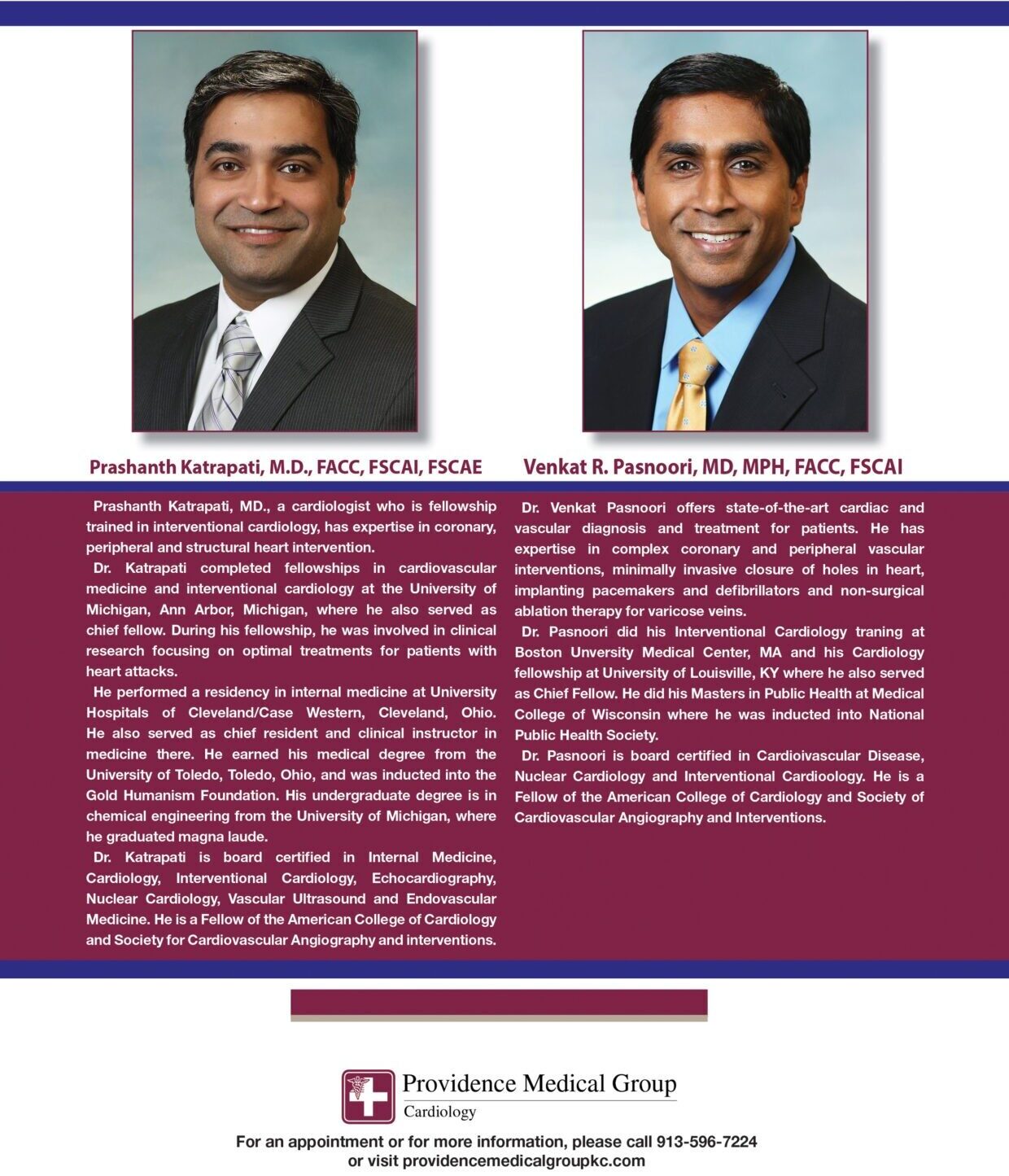Providence-Medical Cardiology

Story by Jeanie Edgmon
Starting the Heart Health Conversation: 10 Things You Can Change in 2024
Heart health is a critical aspect of overall well-being, and as we step into 2024, it’s more important than ever to initiate a conversation about the small but impactful changes individuals can make to promote cardiovascular wellness.
 Providence Medical Center cardiologists, Prashanth Katrapati, M.D. FACC, FSCAI, and Venkat R. Pasnoori, M.D., MPH, FACC., both fellowship-trained in interventional cardiology, open the conversation and education to the importance of healthy heart habits.
Providence Medical Center cardiologists, Prashanth Katrapati, M.D. FACC, FSCAI, and Venkat R. Pasnoori, M.D., MPH, FACC., both fellowship-trained in interventional cardiology, open the conversation and education to the importance of healthy heart habits.
Dr. Pasnoori is board-certified in Cardiovascular Disease, Nuclear Cardiology, and Interventional Cardiology. He is a Fellow of the American College of Cardiology and Society for Cardiovascular Angiography and Interventions.
Dr. Katrapati completed fellowships in cardiovascular medicine and interventional cardiology at the University of Michigan, Ann Arbor, Michigan., where he also served as chief Fellow. During his fellowship, he was involved in clinical research focusing on optimal treatments for patients with heart attacks. In addition, he has presented at regional and national conferences.
“Heart disease doesn’t get the same reaction as when someone talks about cancer,” shared Dr.Katrapati. “People tend to view heart disease or heart attacks as finite events when in reality, heart disease is no different than cancer in that it is a lifelong issue for patients, and we need to help people understand that sustained behavioral changes are necessary to prevent future events.”
Dr. Pasnoori agrees and adds, “Cardiovascular diseases are the leading cause of death globally taking an estimated 17.9 million lives each year. With such a high mortality rate, the practice of cardiology has become more important and there are now more opportunities than ever for improvements in cardiovascular disease prevention, diagnosis, and treatment.”
This discussion is particularly relevant for both healthcare professionals and patients he explains, as prevention and early intervention are key in mitigating the risk of heart-related issues.
They took the time to share ten practical and evidence-based practices that individuals can implement in their lives to enhance heart health.
Set Achievable Goals
One of the biggest saboteurs of success is setting unattainable goals. This is especially true in health goals.
“Look for small, medium, and large goals to help conquer the year. The first step in any journey is having a vision of where you want to be concerning your overall health. For some it might be simply to exercise three days a week, for others it might be to combat a chronic illness. The most important thing is to start slow and build up.”
Adopt a Heart-Healthy Diet
The cornerstone of cardiovascular health lies in maintaining a balanced and nutritious diet. Katrapati suggests encouraging patients to consume a diet rich in fruits, vegetables, whole grains, and lean proteins. Limiting saturated and trans fats, as well as reducing sodium intake, can contribute to better heart health. Emphasize the importance of portion control and mindful eating to prevent overconsumption of calories. A great place to start is to minimize processed foods and trying to eat at least three healthy meals a week would be a practical and achievable goal for 2024.
Regular Physical Activity
Engaging in regular physical activity is a non-negotiable factor in maintaining heart health. Suggest a minimum of 150 minutes of moderate-intensity aerobic exercise per week or 75 minutes of vigorous-intensity exercise. Incorporating strength training exercises at least twice a week further enhances cardiovascular fitness. Encourage patients to find activities they enjoy to increase adherence to their exercise routine.
“Walk 7500 steps a day, if you can’t walk then swim, if you can’t swim then ride a bike. Exercise is not something that has to be done at the gym or on exercise equipment at home. Simply going for an evening walk for 30 minutes is more than enough for most people,” shared Dr. Katrapati.
Effective Stress Management
Chronic stress can take a toll on the heart. Dr. Katrapati recommends stress management techniques such as meditation, deep breathing exercises, yoga, or mindfulness. “Encourage patients to identify stress triggers and develop strategies to cope with them effectively. Stress reduction can contribute not only to heart health but also to overall mental well-being.”
Smoking Cessation
Smoking is a major risk factor for heart disease. “Support patients in their efforts to quit smoking by providing resources, counseling, and pharmacological interventions as appropriate. Highlight the rapid improvement in cardiovascular health that occurs after quitting, reinforcing the long-term benefits of a smoke-free lifestyle,” Dr. Katrapati added.
Regular Health Check-ups
Prevention is key, and regular health check-ups are instrumental in identifying and managing risk factors for heart disease. Encourage patients to schedule routine screenings for blood pressure, cholesterol levels, and blood glucose. Early detection of abnormalities allows for timely intervention and reduces the risk of complications.
Limit Alcohol Consumption
Moderate alcohol consumption may have certain cardiovascular benefits, however, excessive drinking poses significant health risks. They advise patients to limit alcohol intake to moderate levels, defined as up to one drink per day for women and up to two drinks per day for men.
Maintain a Healthy Weight
Obesity is a well-established risk factor for heart disease. We work with patients to set realistic weight loss goals and develop sustainable strategies for achieving them. Emphasize the importance of a comprehensive approach that includes dietary modifications, increased physical activity, and behavioral changes.
“Lose 5% of your body weight this year (don’t aim for the 6 pack of abs, just start with this simple goal). So a person weighing 200 lbs would try to get down to 190,” Dr.Katrapati urged.
Monitor Blood Pressure and Cholesterol
Elevated blood pressure and cholesterol levels are key indicators of cardiovascular risk. Regularly monitor and manage these parameters through lifestyle modifications and, if necessary, pharmacological interventions. They educate patients on the significance of maintaining optimal blood pressure and cholesterol levels for long-term heart health.
“Get your cholesterol and BP checked to see if you need medication. Besides smoking, cholesterol and BP are the largest contributing factors to heart disease. So, get them checked, even if you are young. I would recommend every adult should get it checked at least once a year,” Dr. Katrapati added.
Get Proper Sleep
“Most of us don’t get enough sleep. The most important thing is to set a schedule, abide by it, and achieve at least 7 hours of sleep each night,” urges Dr. Katrapati.
Sleep plays a crucial role in maintaining overall health, and its impact on heart health is particularly significant. Adequate and quality sleep is essential for various physiological functions, and disruptions in sleep patterns can have adverse effects on the cardiovascular system. Proper sleep plays a role in blood pressure regulation, heart rate control, immune function, and the reduction of stress and cortisol levels.
Supporting Sustainable Change in Heart Health
Heart disease remains a major cause of morbidity, yet it is largely preventable. By modifying risk factors such as tobacco use, high blood pressure, high cholesterol, alcohol consumption, physical inactivity, obesity, and unhealthy diet patients can lower their risks and improve their overall health.
“Sustainable change is at the heart (pun intended) of what we do. People oftentimes have a perception that when someone gets a stent or medicine, their problems will be immediately resolved. Unfortunately, the process of heart disease is borne out of decades of genetically and behaviorally mediated insults. Therefore, I explain to my patients that whether it is medicines or behavior changes – consistency matters. We often take our car in to get an oil change every 6 months, but we rarely see our doctor every 6 months for routine checkups. So routine evaluation and small sustainable goals/lifestyle changes are essential for long-term health,” concluded Dr. Katrapati.
Sustainable change in heart health is essential for long-lasting benefits, prevention of chronic conditions, and the overall well-being of individuals and communities. By fostering positive and lasting habits, individuals can significantly reduce their risk of heart-related issues and enjoy a higher quality of life.








